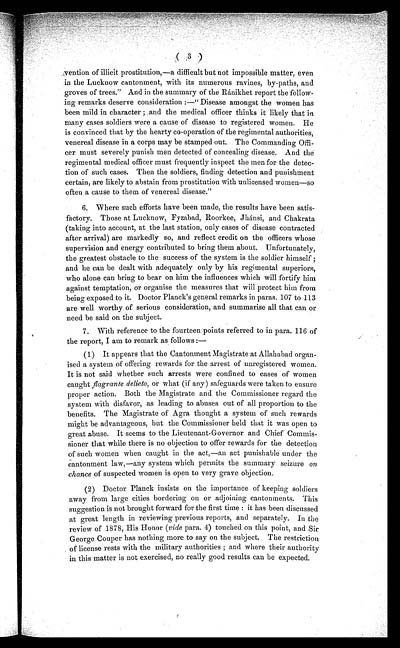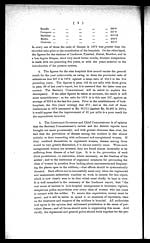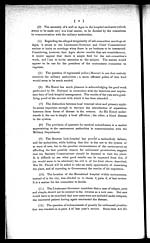Medicine - Institutions > Lock hospitals > Annual report on the working of the lock hospitals in the North-Western Provinces and Oudh > Sixth annual report of the working of the lock hospitals in the North-Western Provinces and Oudh, for the year 1879
(225) Page 3
Download files
Individual page:
Thumbnail gallery: Grid view | List view

( 3 )
vention of illicit prostitution,—a difficult but not impossible matter, even
in the Lucknow cantonment, with its numerous ravines, by-paths, and
groves of trees." And in the summary of the Ránikhet report the follow-
ing remarks deserve consideration :—" Disease amongst the women has
been mild in character ; and the medical officer thinks it likely that in
many cases soldiers were a cause of disease to registered women. He
is convinced that by the hearty co-operation of the regimental authorities,
venereal disease in a corps may be stamped out. The Commanding Offi-
cer must severely punish men detected of concealing disease. And the
regimental medical officer must frequently inspect the men for the detec-
tion of such cases. Then the soldiers, finding detection and punishment
certain, are likely to abstain from prostitution with unlicensed women—so
often a cause to them of venereal disease."
6. Where such efforts have been made, the results have been satis-
factory. Those at Lucknow, Fyzabad, Roorkee, Jhánsi, and Chakrata
(taking into account, at the last station, only cases of disease contracted
after arrival) are markedly so, and reflect credit on the officers whose
supervision and energy contributed to bring them about. Unfortunately,
the greatest obstacle to the success of the system is the soldier himself ;
and he can be dealt with adequately only by his regimental superiors,
who alone can bring to bear on him the influences which will fortify him
against temptation, or organise the measures that will protect him from
being exposed to it. Doctor Planck's general remarks in paras. 107 to 113
are well worthy of serious consideration, and summarise all that can or
need be said on the subject.
7. With reference to the fourteen points referred to in para. 116 of
the report, I am to remark as follows :—
(1) It appears that the Cantonment Magistrate at Allahabad organ-
ised a system of offering rewards for the arrest of unregistered women.
It is not said whether such arrests were confined to cases of women
caught flagrante delicto, or what (if any) safeguards were taken to ensure
proper action. Both the Magistrate and the Commissioner regard the
system with disfavor, as leading to abuses out of all proportion to the
benefits. The Magistrate of Agra thought a system of such rewards
might be advantageous, but the Commissioner held that it was open to
great abuse. It seems to the Lieutenant-Governor and Chief Commis-
sioner that while there is no objection to offer rewards for the detection
of such women when caught in the act,—an act punishable under the
cantonment law,—any system which permits the summary seizure on
chance of suspected women is open to very grave objection.
(2) Doctor Planck insists on the importance of keeping soldiers
away from large cities bordering on or adjoining cantonments. This
suggestion is not brought forward for the first time : it has been discussed
at great length in reviewing previous reports, and separately. In the
review of 1878, His Honor (vide para. 4) touched on this point, and Sir
George Couper has nothing more to say on the subject. The restriction
of license rests with the military authorities ; and where their authority
in this matter is not exercised, no really good results can be expected.
Set display mode to: Large image | Zoom image | Transcription
Images and transcriptions on this page, including medium image downloads, may be used under the Creative Commons Attribution 4.0 International Licence unless otherwise stated. ![]()
| Permanent URL | https://digital.nls.uk/75111507 |
|---|




